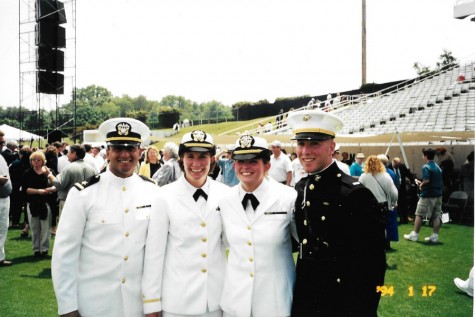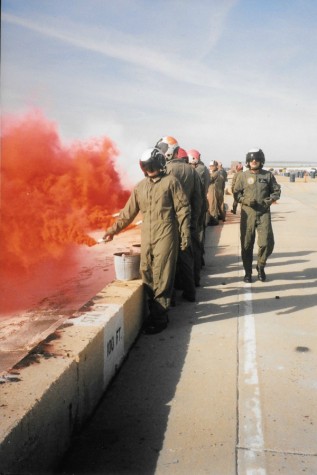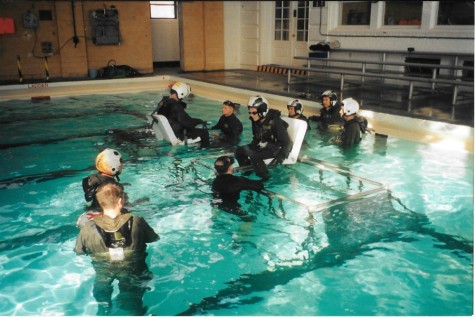Chaput encourages students to explore
January 22, 2016
Often in high school students work on group projects cooperatively with one another. However, many do not think about working together for something more than a grade. Math teacher Elisabeth Chaput has experienced working for something important and world-changing during the time she spent at the Naval Academy in Annapolis.
“You’re working with a team for something that is bigger than everyone,” said Chaput.
While Chaput joined the Naval Academy at a young age, she was not always interested in the military. However, her surroundings heavily influenced her decision to become a part of the Navy.
“I grew up in the Washington DC area, so we were always around other military folk. I was working at this nonprofit organization, No Greater Love, which would help children of those who were killed in acts of terrorism or war. We were preparing things for the holidays, giving gifts to those kids, and the woman who ran it, she used to date the quarterback of the Navy [football team] a long time ago, so we were watching it and I thought it was awesome to see all of these people; the whole [Naval Academy] was there, and that kind of piqued my interest,” said Chaput.

Chaput’s father also worked for the Navy as a contractor. His company, Nav-Air, would be responsible for contracting the purchase of weapons and missiles for the Navy. Because of this immediate connection, Chaput was exposed to the military throughout childhood.
“It was something that I was comfortable with. I got all my questions answered nearby, it turned out my neighbor went to the Naval Academy as well, so I ended up talking to him about it. He had graduated in ’43,” said Chaput.
This initial interest began for Chaput when she was 15 years old. This interest in the Navy only grew as Chaput looked at more information and researched the career.
“At first [what attracted me to the school] was the atmosphere, the camaraderie, everyone being a part of something that was bigger than themselves, but as I did more research I found that it was super challenging, hard to get into, and it was just a great school. I liked the challenge for sure, the education was top notch, and it was unique too, I liked that also,” said Chaput.
Eventually, she fell in love with the prospect of joining the Naval Academy, and applied as she graduated college. Unfortunately, she was met with a rejection from the Academy, but she did not give up her dream.
“I was not accepted the first time [I applied]. I ended up going to prep school for a year in California, and I went to college and worked at a law firm part time for a semester. Then I went to the Naval Academy the next year. I was nineteen when I got there,” said Chaput.
Chaput graduated from the Naval Academy and was commissioned as a Naval Officer in May, 2001. She continued to work at the Naval Academy until October, 2001, and noticed a change in the atmosphere after the September 11th terrorist attacks.
“It was very interesting to me because when we graduated it was not war. We were not at war. And then we were,” said Chaput.

Chaput also remembers a standout memory from her time in the Academy.
“We had to jump off a ten meter board in order to graduate. They started doing this thing called the Crucible that you have to go through at the end of your Plebe year [Freshman year] at the Naval Academy. It was something that they used to do in boot camp for the marine corps, and then they started to integrate it into what we did. It was an all day thing, where we were up at 4:30 and we finished at 4:30, but you’re going non-stop. I’m not even exaggerating, you ran or walked everywhere, carrying rifles and packs, and doing obstacle courses. Then in Youngster year [Sophomore year], you have to jump off a ten meter board before you can move on. If you don’t then they kick you out, because the idea is you need to be able to jump off a ship if its going down. Its amazing, like you get up there, and you jump off, and you have enough time to think, ‘wow this is taking a long time’ and then you hit the water,” said Chaput.
In October after her graduation, she moved on to the next part of her training: flight school.
During her time in flight school, she went through many tests. The tests were primarily to ensure that Chaput would be able to handle any situations thrown at her in the case that she was sent into combat.
“They make sure you’re not going to get vertigo, they do decompression chambers, water tests to make sure you don’t freak out if you get in the water, parachute tests, that kind of stuff,” said Chaput.
After all of the tests, Chaput went on to actually fly planes, and learn some of the maneuvers and skills necessary to actually pilot a plane.
“You go over how to stall a plane and recover it mid flight, how to land and how to take off, flying at night, doing visual rules, and how to navigate if you are not flying,” said Chaput.
She remained in flight school until 2003, when she was discharged from the Navy entirely.
“I actually got discharged because of food allergies. You have to be absolutely perfect [to deploy]. They told me their thinking was, ‘you couldn’t scrap a mission’ because I was having a food allergy, because it would put my life at risk and those around me at risk,” said Chaput.
Fortunately, Chaput was not without friends during her time in the Naval Academy. She even met her spouse there, and despite their ever-changing lifestyle they remained together.

“We met on our last year, at spring break. We went down to Key West with a group of friends and we talked the whole way down from Maryland to Key West, and we fell in love. We spent all our time together after that, graduated, and I was in Maryland and he was in Virginia. I went to Florida and he went to South Carolina when we got engaged. He went to California, and then to Iraq, while I got discharged, moved back to Virginia and moved to California after he returned from Iraq the first time. That was the first one, [Operation Iraqi Freedom], when they went into Baghdad. He stayed for eight months and then went back after that. This was still back in 2004,” said Chaput.
All of the moving around as a Navy Contractor was very stressful for Chaput, especially with her husband serving overseas, so once he returned from his tour they moved to Massachusetts, where Chaput worked teaching math to students in Monson, Mass.
Chaput also believes that her time in the Navy helps her with her teaching, in terms of staying organized and prioritizing material.
One of the most interesting parts of Chaput’s career in the Naval Academy was the discrimination that she faced as a woman in the military. While she was fortunate enough to never experience personal discrimination, she was restricted, as all women were, from joining specific specializations of the Navy.
“When I was going into the Naval Academy, a male could go on a submarine, and be a Navy SEAL [Sea Air and Land Teams] but a woman couldn’t. Now women can be on submarines, and the SEAL thing is still up in the air. For the marines, they’ve talked about opening that up, but I think the fact is there are not that many [women] out there that could do the physical part of the training. Women and men are just built different ways. I think it should be available, but at the same time, you cannot have exceptions and work well together in a unit in stressful situations, so it has to be the same across the board,” said Chaput.
Recently, the Navy has opened up those positions to women, further reducing the potential inequality that women can experience in the military.
Currently, the United States has the largest volunteer military in the country’s history. However, the number of students from WA that have shown interest in the military has been minimal. Chaput encourages students to join any branch of the military, as she believes it is an extremely beneficial learning experience that everyone can participate in.
“I think that it really helps you appreciate what’s going on outside of your little world. Not only because you get to meet people from all different parts of the country that have a different life experience, but what you are doing is part of a bigger mission, and it is selfless. That’s really important for folks to experience. I’m not saying if you haven’t done that then you are not a good person or anything, but I think that it is eyeopening. I think it can make you better if you do it,” said Chaput.
Overall, Chaput encourages students to break out of their comfort zone, and experience volunteering their time in any branch of the military.
“If you want to do it, then do it, don’t wait for them to come ask you,” said Chaput.